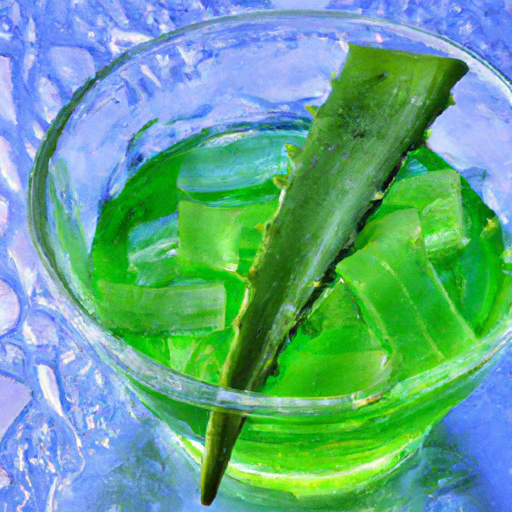The Wonderful World of Aloe Water: A Refreshing Twist in Cooking
Imagine sipping on a cool, revitalizing beverage that not only quenches your thirst but also offers a myriad of health benefits. Enter aloe water, a lesser-known yet incredibly versatile ingredient that has been gaining popularity in recent years. In this blog post, we will explore the intriguing world of aloe water, diving into its unique taste, common cooking uses, nutritional value, and fascinating history. So grab a glass and let’s dive in!
Aloe Water: A Unique Tasting Experience
Aloe water boasts a refreshingly mild and slightly tangy flavor profile. Its taste can be compared to a delicate blend of cucumber and green apple, producing a subtly sweet and herbaceous essence. With its clean and crisp notes, aloe water brings a unique twist to culinary creations, providing a light and invigorating touch.
Culinary Applications: Versatility at Its Finest
Beyond being a delightful beverage on its own, aloe water’s versatility shines through in various cooking applications. It can be integrated into both sweet and savory recipes, elevating flavors and adding an unexpected twist. Here are a few creative ways to incorporate aloe water into your culinary endeavors:
1. Smoothies and Juices
Blend aloe water with your favorite fruits, such as pineapple, mango, or berries, for a revitalizing and hydrating twist to your morning smoothie or juice. Its subtly sweet taste complements an array of flavors, turning an ordinary drink into a refreshing and nourishing treat.
2. Salad Dressings and Sauces
Add aloe water to your homemade salad dressings or sauces to infuse them with a fresh twist. Its light and tangy flavor enhance vinaigrettes, marinades, and even creamy dressings, bringing a revitalizing touch to your greens or grills.
3. Gelatin Substitutes
Aloe water can be used as a gelatin substitute in various recipes. Its natural thickening properties make it an ideal ingredient in vegan or vegetarian desserts, creating a jelly-like consistency. Try incorporating aloe water into your next panna cotta, mousse, or jelly recipe for a delightful and healthier alternative.
4. Hydrating Ice Cubes and Popsicles
Freeze aloe water into ice cubes or use it as a base for homemade popsicles. These icy treats not only provide a cooling sensation on hot summer days but also deliver a boost of hydration and a unique twist to your frozen delights.
Nutritional Gems: Hydration and More
Aside from its enticing taste and culinary versatility, aloe water packs a nutritional punch too. It is a natural source of hydration, containing over 95% water content, making it an excellent way to quench your thirst and stay refreshed. Aloe water is also rich in essential vitamins, minerals, and antioxidants, making it a valuable addition to a balanced diet.
Some notable nutritional benefits of aloe water include:
- Vitamin C: Aloe water contains vitamin C, an immune-boosting nutrient that supports collagen production and promotes healthy skin.
- Antioxidants: Loaded with antioxidants such as flavonoids and polyphenols, aloe water helps combat oxidative stress and reduce inflammation in the body.
- Electrolytes: Aloe water contains electrolytes like potassium and magnesium, aiding in maintaining proper fluid balance and supporting optimal muscle function.
Aloe Water’s Historical Significance and Fun Facts
Aloe water’s usage dates back centuries and spans across cultures. The ancient Egyptians referred to aloe as the “plant of immortality” and believed in its healing and rejuvenating properties. Throughout history, aloe has been utilized for its medicinal benefits, soothing properties, and cosmetic applications.
Here are a few fascinating facts about aloe water:
- Aloe vera, the plant from which aloe water is derived, belongs to the succulent family and is native to the Arabian Peninsula.
- The gel-like substance found in the leaves of the aloe vera plant is what is typically used to make aloe water.
- Aloe plants are incredibly resilient and can survive in arid climates, making them a valuable natural resource in many regions.
Wrap Up
With its unique taste, culinary versatility, and nutritional benefits, aloe water is undoubtedly a fascinating ingredient to explore in the kitchen. From refreshing beverages to vibrant desserts, its invigorating touch adds an extra layer of interest to various culinary creations. So next time you’re looking to infuse your dishes with a twist, consider reaching for aloe water and embark on a deliciously hydrating culinary adventure!
Aloe Water
Origin: Aloe water is made from the gel-like substance found in the leaves of the aloe vera plant, scientifically known as Aloe barbadensis miller. Aloe vera is believed to have originated in the Arabian Peninsula, but it is now cultivated worldwide in tropical and subtropical regions.
Common Uses: Aloe water is commonly ingested as a beverage and is also used in cosmetic products due to its potential health benefits. It has gained popularity for its hydrating properties, and some people consume it to support digestion, boost the immune system, or promote healthy skin.
Nutritional Benefits: Aloe water contains several vitamins, including vitamin C, vitamin E, and vitamin B complex. It also provides minerals such as calcium, magnesium, and potassium. Aloe water is low in calories and fat, making it a desirable choice for those seeking a refreshing, low-calorie beverage.
Unique Properties: Aloe water is known for its high water content (over 95%), which contributes to its hydrating properties. It also contains various beneficial compounds, such as polysaccharides, antioxidants, and enzymes. Aloe vera latex, a yellowish sap found just beneath the outer leaf skin, has a laxative effect and is not typically used in aloe water production.
Historical Significance: Aloe vera has a rich history dating back thousands of years, with records of its use appearing in ancient civilizations such as Egypt, Greece, and China. It was highly regarded for its healing properties and was often used to treat skin conditions and promote overall well-being. Today, aloe water and other aloe vera products continue to be consumed and used for their potential health benefits.




Use the share button below if you liked it.
It makes me smile, when I see it.